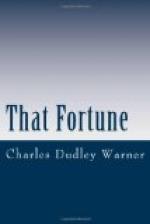V
It is the desire of every ambitious soul to, enter Literature by the front door, and the few who have patience and money enough to live without the aid of the beckoning Helen may enter there. But a side entrance is the destiny of most aspirants, even those with the golden key of genius, and they are a long time in working their way to be seen coming out, of the front entrance. It is true that a man can attract considerable and immediate attention by trying to effect an entrance through the sewer, but he seldom gains the respect of the public whom he interests, any more than an exhibitor of fireworks gains the reputation of an artist that is accorded to the painter of a good picture.
Philip was waiting at the front door, with his essays and his prose symphonies and his satirical novel—the satire of a young man is apt to be very bitter—but it was as tightly shut against him as if a publisher and not the muse of literature kept the door.
There was a fellow-boarder with Philip, whose acquaintance he had made at the common table in the basement, who appeared to be free of the world of letters and art. He was an alert, compact, neatly dressed little fellow, who had apparently improved every one of his twenty-eight years in the study of life, in gaining assurance and confidence in himself, and also presented himself as one who knew the nether world completely but was not of it. He would have said of himself that he knew it profoundly, that he frequented it for “material,” but that his home was in another sphere. The impression was that he belonged among those brilliant guerrillas of both sexes, in the border-land of art and society, who lived daintily and talked about life with unconventional freedom. Slight in figure, with very black hair, and eyes of cloudy gray, an olive complexion, and features trained to an immobility proof against emotion or surprise, the whole poised as we would say in the act of being gentlemanly, it is needless to say that he took himself seriously. His readiness, self-confidence, cocksureness, Philip thought all expressed in his name —Olin Brad.
Mr. Brad was not a Bohemian—that is, not at all a Bohemian of the recognized type. His fashionable dress, closely trimmed hair, and dainty boots took him out of that class. He belonged to the new order, which seems to have come in with modern journalism—that is, Bohemian in principle, but of the manners and apparel of the favored of fortune. Mr. Brad was undoubtedly clever, and was down as a bright young man in the list of those who employed talent which was not dulled by conscientious scruples. He had stood well in college, during three years in Europe he had picked up two or three languages, dissipated his remaining small fortune, acquired expensive tastes, and knowledge, both esoteric and exoteric, that was valuable to him in his present occupation. Returning home fully equipped for




